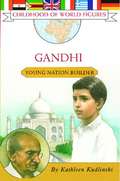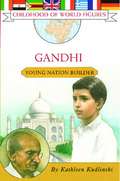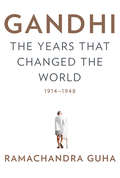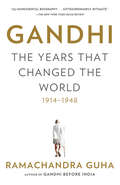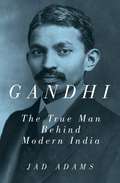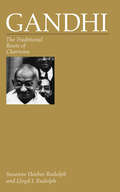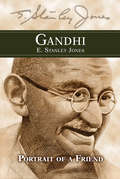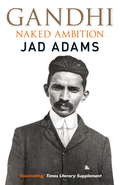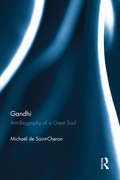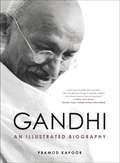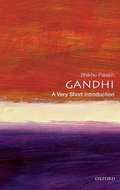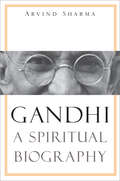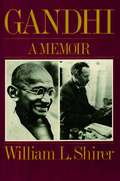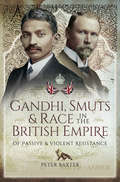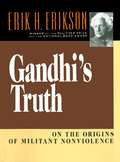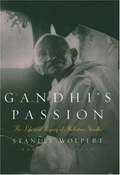- Table View
- List View
Gandhijiyin Irudhi 200 Naatkal: காந்திஜியின் இறுதி 200 நாட்கள்
by V. Ramamurthyஇந்நூலில் காந்திஜியின் கடைசி 200 நாட்கள் ஆவணப்படுத்தப்பட்டிருக்கின்றன. மேலும் அவர் தன்னுடைய கடைசி 200 நாட்களில் மக்களுக்காக எவ்வளவு பாடுபட்டார் என்பதை பற்றி வி. ராமமூர்த்தி மிகவும் அவர்கள் மிகுந்த பொறுப்புணர்வுடன் கூறியுள்ளார்.
Gandhijinu Jivan — Emnaj Shabdoma
by Krishna Kruplaniહું મારા ઘરની આસપાસ દીવાલ ચણી લેવા તથા મારી બારીઓ બંધ કરી દેવા નથી માગતો. મારા ઘરની આસપાસ સઘળા દેશોની સંસ્કૃતિના પવનની લહેરીઓ છૂટથી વાતી રહે એમ હું ઇચ્છું છું. પણ પવનની એવી કોઈ લહરી દ્વારા જમીનથી અધ્ધર થઈ જવાનો હું ઇનકાર કરું છું. સાહિત્યમાં રસ ધરાવતાં આપણાં તરુણ સ્ત્રીપુરુષો અંગ્રેજી ભાષા તેમ જ બીજી વિશ્વભાષાઓ પેટ ભરીને શીખે એમ હું ઇચ્છું છું. અને પછી તેઓ જગદીશચંદ્ર બોઝ, પ્રફુલ્લચંદ્ર રોય અને કવિવર રવીન્દ્રનાથ ટાગોરની પેઠે પોતાના અભ્યાસનો લાભ હિંદને તથા દુનિયાને આપે એવી તેમની પાસેથી અપેક્ષા રાખું. પરંતુ એક પણ હિંદવાસી પોતાની માતૃભાષાને ભૂલે, તેની અવગણના કરે કે તેનાથી શરમાય અથવા પોતાની માતૃભાષામાં પોતે વિચાર કરી શકતો નથી કે પોતાના વિચારો સારામાં સારી રીતે દર્શાવી શકતો નથી એમ તેને લાગે, એમ હું ઇચ્છતો નથી. મારો ધર્મ ચોકાપંથી નથી. — ગાંધીજી
Gandhijiki Sankshipt Aatmakatha: गांधीजीकी संक्षिप्त आत्मकथा
by Kashinath Trivediबापूकी 'आत्मकथा' एक बड़ा ग्रंथ है। इस पुस्तकमें उसका सार तैयार किया गया है। ऐसा करते समय बापूके लेखन-क्रम, भाषा इत्यादिको प्रायः मूलके जैसा ही रखा गया है। केवल विषयको संक्षिप्त करने और सिलसिला जोड़नेके लिए कहीं-कहीं नयी भाषाका प्रयोग किया गया है। अतः सहज रूपसे यह कहा जा सकता है कि इस संक्षिप्त आत्मकथा' का ९९.९९ से भी अधिक भाग मूलका अवतरण ही है। इस 'संक्षिप्त आत्मकथा' को नये ढंगसे विभक्त किया गया है और कुछ अध्यायोंको उन विषयों के अनुरूप नये नाम दिये गये हैं। अध्यायों की गिनती प्रत्येक खण्डकी अलग-अलग न करके समूची पुस्तककी एक ही रखी गई है। बापूकी 'आत्मकथा' एक ऐसा ग्रंथ है, जो बापूको समझने में बहुत सहायक होता है। इसका संक्षिप्त संस्करण तैयार करनेका यह प्रयास इस अभिलाषासे किया गया है कि यह विशिष्ट व्यक्तियोंको और खासकर नयी पीढ़ीको बापूका अभ्यास करनेके लिए प्रेरित करे।
Gandhiji (Gujarati)
by Jugatram Daveગૂજરાત વિદ્યાપીઠ તરફથી દર વરસે ગાંધીજયંતીને દિવસે ‘ગાંધીજીવન-ઝાંખી‘ની પરીક્ષા લેવાય છે. પાંચથી સાત ધોરણના વિદ્યાર્થીઓ માટેની આ પરીક્ષામાં કુદસિયા જૈદીનું ‘ગાંધીબાપુ‘ પુસ્તક શરૂથી પાઠ્યપુસ્તક તરીકે ચાલે છે. ચાલુ વરસથી આ પુસ્તક ઉપરાંત ગાંધીજીના જીવનના પ્રસંગો આલેખતું સ્વ. શ્રી જુગતરામ દવેનું ‘ગાંધીજી‘ પુસ્તક પણ પાઠ્યપુસ્તક તરીકે ઉમેરવાનું નક્કી થયું છે. એ પુસ્તકની પહેલી આવૃત્તિ 1929માં પ્રસિદ્ધ થયેલી. આજ સુધીમાં તેની લગભગ લાખ જેટલી નકલો વેચાઈ છે. આ પુસ્તક એ જ પુસ્તકની પરીક્ષા માટેની રાહત દરની ખાસ આવૃત્તિ છે. પરીક્ષામાં બેસનાર વિદ્યાર્થીઓ ગાંધીજીના જીવન અને કાર્યને વ્યક્ત કરતાં કાવ્યોનો મુખપાઠ કરે તે જરૂરી લાગતાં આ આવૃત્તિમાં તેવાં પાંચ કાવ્યો પુસ્તકને અંતે આપ્યાં છે.
Gandhi: गांधी: कार्य व विचारप्रणाली
by Prof. Bhaskar Ramchandra Bapatगांधी आणि माओ या आधुनिक काळातील दोन अलौकिक क्रांतिकारक व्यक्ती होत. ‘पॉवर ग्रोज आउट ऑफ द बॅरल ऑफ ए गन’ असे म्हणणाऱ्या माओचे गांधींशी काय साम्य असे प्रथमतः वाटते. वरील वचनामध्ये माओ शासनसत्तेविषयी विलक्षण जागरूकता दाखवितो; समाजिक व्यवहारात सत्ता कोणाच्या हाती आहे हा मोक्याचा प्रश्न असतो हे स्पष्ट करतो. गांधी अराज्यवादी म्हणून ओळखले जातात.
Gandhi: Young Nation Builder (Childhood of Famous Americans Series)
by Kathleen V. KudlinskiThis book narrates the fascinating early years and eventual accomplishments of the inspiring leader, Mahatma Gandhi, who is known as the Father of the Nation of India.
Gandhi: Young Nation Builder
by Kathleen KudlinskiA childhood biography of the great political and social leader.Mohandas K. Gandhi (1869-1948) studied law in England, then spent 20 years defending the rights of immigrants in South Africa. In 1914 he returned to India and became the leader of the Indian National Congress. Gandhi urged non-violence and civil disobedience as a means to independence from Great Britain, with public acts of defiance that landed him in jail several times. In 1947 he participated in the postwar negotiations that led to Indian independence. He was shot to death by a Hindu fanatic in 1948. This childhood biography highlights the events that informed Gandhi's indomitable spirit.
Gandhi: The Years That Changed The World, 1914-1948
by Ramachandra GuhaAn epic and revelatory biography of one of the most abidingly influential--and controversial--men in modern history.Opening with Gandhi's triumphant return to India in 1915 after decades abroad, and ending with his tragic assassination in 1949, Gandhi: The Years that Changed the World is a remarkable, moving portrait that provides a crucial re-evaluation of India's iconic leader for a new generation. <p><p> Drawing on a wealth of newly uncovered materials unavailable to previous biographers, acclaimed historian and author Ramachandra Guha brings the past to life with extraordinary grace and clarity. Deploying his gifts as a storyteller and scholar, Guha presents Gandhi as both a fascinating human being--a man of fierce hope, eccentric personal beliefs, and sometimes dark and alarming contradictions--as well as a dynamic political force and global icon. <p> Sharp, insightful, balanced, and impeccably researched, this free-standing sequel to Guha's magisterial biography Gandhi Before India is an indispensable resource for a contemporary understanding of Gandhi's ever-evolving legacy.
Gandhi: The Years That Changed The World, 1914-1948
by Ramachandra GuhaThe second and concluding volume of the magisterial biography that began with the acclaimed, Gandhi Before India: the definitive portrait of the life and work of one of the most abidingly influential--and controversial--men in world history. <p><p> This volume opens with Mohandas Gandhi's arrival in Bombay in January 1915 and takes us through his epic struggles over the next three decades: to deliver India from British rule, to forge harmonious relations between India's Hindu and Muslim populations, to end the pernicious Hindu practice of untouchability, and to develop India's economic and moral self-reliance. We see how in each of these campaigns, Gandhi adapted methods of nonviolence--strikes, marches, fasts--that successfully challenged British authority, religious orthodoxy, social customs, and would influence non-violent, revolutionary movements throughout the world. <p> In reconstructing Gandhi's life and work, Ramachandra Guha has drawn on sixty different archival collections, the most significant among them, a previously unavailable collection of papers belonging to Gandhi himself. <p> Using this wealth of material, Guha creates a portrait of Gandhi and of those closest to him--family, friends, political and social leaders--that illuminates the complexity inside his thinking, his motives, his actions and their outcomes as he engaged with every important aspect of social and public life in the India of his time.
Gandhi: The True Man Behind Modern India
by Jad Adams"Provocative. Adams strips away Gandhi's saintly aura and explores the duality of India's most famous leader."--Financial Times Jad Adams traces the course of Gandhi's multi-faceted life and the development of his religious, political, and social thinking over seven tumultuous decades: from his comfortable upbringing in a princely state in Gujarat; his early civil rights campaigns; his leadership through civil disobedience in the 1920s and 1930s that made him a world icon; and finally to his assassination by a Hindu extremist in 1948, only months after the birth of an independent India. An elegant and masterly account of one of the seminal figures of twentieth-century history, Adams presents for the first time the true story behind the man whose life may truly be said to have changed the world.
Gandhi: The Traditional Roots of Charisma
by Susanne Hoeber Rudolph Lloyd I. RudolphThe Rudolphs' analysis reveals that Gandhi's charisma was deeply rooted in the aspects of Indian tradition that he interpreted for his time. They key to his political influence was his ability to realize in both his daily life and his public actions, cultural ideals that many Indians honored but could not enact themselves—ideals such as the traditional Hindu belief that a person's capacity for self-control enhances his capacity to control his environment. Appealing to shared expectations and recognitions, Gandhi was able to revitalize tradition while simultaneously breaking with some of its entrenched values, practices, and interests. One result was a self-critical, ethical, and inclusive nationalist movement that eventually led to independence.
Gandhi: The Traditional Roots of Charisma
by Susanne Hoeber Rudolph Lloyd I. RudolphThe Rudolphs' analysis reveals that Gandhi's charisma was deeply rooted in the aspects of Indian tradition that he interpreted for his time. They key to his political influence was his ability to realize in both his daily life and his public actions, cultural ideals that many Indians honored but could not enact themselves—ideals such as the traditional Hindu belief that a person's capacity for self-control enhances his capacity to control his environment. Appealing to shared expectations and recognitions, Gandhi was able to revitalize tradition while simultaneously breaking with some of its entrenched values, practices, and interests. One result was a self-critical, ethical, and inclusive nationalist movement that eventually led to independence.
Gandhi: Portrait of a Friend
by E. Stanley Jones"On the day that Mahatma Gandhi was killed, I arrived in Delhi just an hour and a quarter before the tragedy ... the greatest tragedy since the Son of God died on the cross." So begins this compelling account of Gandhi by E. Stanley Jones, the world-renowned missionary evangelist to India during 40 seething years of struggle. Based on an intimate knowledge and understanding, Jones's revealing interpretation was written in gratitude to Gandhi, who, although they often disagreed, showed Jones "more of the spirit of Christ than perhaps any other . . . in East or West.""Martin Luther King, Jr., told me he owed a debt to my father for his book on Mahatma Gandhi. He had read many books on Gandhi, read his writings, but it was that particular book of my father's that had triggered his decision to use the method of ... nonviolence in his civil rights movement for his people." --Eunice Jones Mathews"Highly recommended."--Library Journal"To understand the meaning of this great leader ... read this book of interpretation."--Kirkus"Jones ... possesses a great gift of sympathetically interpreting the East to the West."--[London] Times Literary Supplement
Gandhi: Naked Ambition
by Jad AdamsThe pre-eminent political and spiritual leader of India's independence movement, pioneer of non-violent resistance through mass civil disobedience, and the man honoured in India as 'father of the nation', Mohandas K. Gandhi has inspired civil rights and liberation movements the world over.Yet he was also a man of many contradictions: a lifelong pacifist whose treatment of his wife and sons bordered on cruelty; a self-denying ascetic who preached the virtues of chastity in marriage yet experienced a high degree of intimate physical female contact; a political radical whose resistance to racism and appreciation of the value of all religions strike a thoroughly modern note, but whose vision of India was of an almost medieval village nation.In Gandhi: Naked Ambition, Jad Adams delineates Gandhi's searing ambition, including his relentless recreation of his own image, from London dandy to naked wise man; his ruthless sacrifice of his family for his principles; and his role in the tragedy of partition.Using material only recently made available, including the most explicit account yet of Gandhi's sexual experiments with the wives of his followers and his teenage grand-nieces, Jad Adams' accessible and challenging biography reveals the man behind the Mahatma.
Gandhi: Anti-Biography of a Great Soul
by Michaël de Saint-CheronThis book is not just another biography of Gandhi. It is valuable because it offers us a French view--- and Jewish too perhaps---- of a man and times so familiar to us and yet which acquires another dimension as it is represented through another culture. There are eloquent accounts in this book of philosophers like Ramakrishna and Vivekananda who influenced Gandhi’s thought and life. Rather than political events, Michaël de Saint-Chéron holds up the force and courage of a man who became a prophet in a blood-thirsty century. Interestingly, the author points out that it is only India and the Middle East which has given the world the two mother religions of Hinduism and Judaism. Neither China nor Europe, two major cultures, have produced a world religion. The book is further enriched by a discussion on Hindu mysticism and the concept of ‘love’ in Judaism. The author also looks at how Gandhi has played a major role on shaping French intellectuals such as Andre Malraux. At the end however, a central dilemma, and a painful one to the work, concerns Gandhi’s silence on the Holocaust. This book will be of interest to scholars working on Gandhian studies, Indian philosophy and Judaism, and to readers of politics, ethics and history.
Gandhi: An Illustrated Biography
by Pramod KapoorRarely seen images and rigorous research provides fascinating insight into one of the most revered figures in modern Indian history. Gandhi is an intimate history of the evolution of a mischievous, fun-loving boy into the Mahatma. From his schooling and early marriage in Kathiawar to his first brushes with the grandeur of London; from his chance employment for a legal case in South Africa to a train ride in Pietermaritzburg that led to his first fight for equality; from a relatively unsuccessful lawyer to a globally celebrated crusader for human rights-Gandhi was that rare rebel who redefined the meaning of mass resistance for generation to come. The chronological text and rarely seen photographs bring out his unique complexities for a new generation of readers.
Gandhi: A Very Short Introduction
by Bhikhu ParekhMohandas Karamchand Gandhi (1869-1948) was one of the few men in history to fight simultaneously on moral, religious, political, social, economic, and cultural fronts. During his time as a lawyer in South Africa he developed his strategy of non-violence: the idea of opposing unjust laws by non-violent protest. He led the Indian National Congress party in three major campaigns against British rule, each culminating in his arrest. In Gandhi, a short introduction to Gandhi's life and thought, Bhikhu Parekh outlines both Gandhi's major philosophical insights and the limitations of his thought. Written with extensive access to Gandhi's writings in Indian languages to which most commentators have little or no access, Parekh looks at Gandhi's cosmocentric anthropology, his spiritual view of politics, and his theories of oppression, non-violent action, and active citizenship. He also considers how the success of Gandhi's principles were limited by his lack of coherent theories of evil, and of state and power. Gandhi's view of man as ascetic allows no room for expressions of the cultural, artistic, or intellectual. Furthermore, he was so hostile to modern civilization that he was unable to appreciate its complex dialectic or offer a meaningful narrative. Nevertheless, Gandhi's life and thought had an enormous impact on the Indian nation, and he continues to be widely revered--known before and after his assassination as Mahatma, the Great Soul.
Gandhi: A Spiritual Biography
by Arvind SharmaIn his Autobiography, Gandhi wrote, "What I want to achieve--what I have been striving and pining to achieve these thirty years--is self-realization, to see God face to face. . . . All that I do by way of speaking and writing, and all my ventures in the political field, are directed to this same end." While hundreds of biographies and histories have been written about Gandhi (1869-1948), nearly all of them have focused on the political, social, or familial dimensions of his life. Very few, in recounting how Gandhi led his country to political freedom, have viewed his struggle primarily as a search for spiritual liberation.Shifting the focus to the understudied subject of Gandhi's spiritual life, Arvind Sharma retells the story of Gandhi's life through this lens. Illuminating unsuspected dimensions of Gandhi's inner world and uncovering their surprising connections with his outward actions, Sharma explores the eclectic religious atmosphere in which Gandhi was raised, his belief in reincarnation, his conviction that morality and religion are synonymous, his attitudes toward tyranny and freedom, and, perhaps most important, the mysterious source of his power to establish new norms of human conduct. This book enlarges our understanding of one of history's most profoundly influential figures, a man whose trust in the power of the soul helped liberate millions.
Gandhi: A Memoir
by William L. ShirerRecalling his friendship and conversations with the late Indian leader, William Shirer presents a portrait of Gandhi that spotlights his frailties as well as his accomplishments.As a young foreign correspondent, William Shirer reported briefly on Gandhi—but the year was 1931, when India's struggle for independence peaked and Gandhi scored perhaps his greatest political success. The year before, he had led a 200-mile march to the sea to pick up a lump of salt—a violation of the British salt tax; and this symbolic act (like—he reminds Shirer—the Boston Tea Party) had propelled the Indian masses into nonviolent civil disobedience on a large scale. To check its spread, Gandhi had been arbitrarily imprisoned. Now he was out of prison and negotiating with the British viceroy: if Gandhi would call off the civil-disobedience campaign and attend an upcoming London conference, the British would make concessions too.These, however, were so limited and vague that many Indian nationalists regarded Gandhi's agreement as a sell-out; but Shirer underlines history's judgment of its wisdom with Gandhi's own words. More importantly, he notes, the British had finally been forced "to deal with an Indian leader as an equal." Along these lines, Shirer also witnessed British discomfiture at Gandhi's arrival—complete with loin cloth, spinning wheel, and goat’s milk; he saw the sensation Gandhi caused in London—and heard him address Lancashire millhands thrown out of work by the Indian boycott of British cotton. And he saw him at home, subsisting on four-hours' sleep and "frenzied acclaim." This book is sure to press upon readers the worldwide force of Gandhi's example. —Kirkus Reviews
Gandhi: 'Hind Swaraj' and Other Writings
by Anthony J. ParelHind Swaraj is Mahatma Gandhi's fundamental work. Not only is it key to understanding his life and thoughts, but also the politics of South Asia in the first half of the twentieth century. Celebrating 100 years since Hind Swaraj was first published in a newspaper, this centenary edition includes a new preface and editor's introduction, as well as a new chapter on 'Gandhi and the 'Canonical aims of life''. The volume presents a critical edition of the 1910 text of Hind Swaraj, fully annotated and including Gandhi's own Preface and Foreword (not found in other editions). Anthony J. Parel sets the work in its historical and political contexts and analyses the significance of Gandhi's experiences in England and South Africa. The second part of the volume contains some of Gandhi's other writings, including his correspondence with Tolstoy and Nehru.
Gandhi, Smuts & Race in the British Empire: Of Passive & Violent Resistance
by Peter BaxterTowards the end of 1906, a meeting took place between two emerging giants of the age, Mohandas K. Gandhi and General Jan Christian Smuts. United under the same empire, but separated by distance and culture, Smuts was born in the Cape Colony, and Gandhi in Porbandar, a duchy of the Indian province of Gujarat. Both, however, went on to study law in Britain, and while developing a great admiration for the institutions of empire, each man also suffered his own particular crisis of faith. From their widely dispersed origins, Gandhi and Smuts collided over the issue of race and equality in a turbulent province of the empire, each attempting to hold the British to their stated ideals. This insightful book explores attitudes to race, and belonging, in an age when the English speaking peoples straddled the globe, and sought to impose on all of their subject races, basking under the radiance of Britannia, a common ideal of parity, equal opportunity and free movement.
Gandhi's Truth: On the Origins of Militant Nonviolence
by Erik H. EriksonIn this study of Mahatma Gandhi, psychoanalyst Erik H. Erikson explores how Gandhi succeeded in mobilizing the Indian people both spiritually and politically as he became the revolutionary innovator of militant non-violence and India became the motherland of large-scale civil disobedience.<P><P> Winner of the National Book Award<P> Pulitzer Prize Winner
Gandhi's Printing Press
by Isabel HofmeyrAt the same time that Gandhi, as a young lawyer in South Africa, began fashioning the tenets of his political philosophy, he was absorbed by a seemingly unrelated enterprise: creating a newspaper. Gandhiâe(tm)s Printing Press is an account of how this project, an apparent footnote to a titanic career, shaped the man who would become the world-changing Mahatma. Pioneering publisher, experimental editor, ethical anthologistâe"these roles reveal a Gandhi developing the qualities and talents that would later define him. Isabel Hofmeyr presents a detailed study of Gandhiâe(tm)s work in South Africa (1893âe"1914), when he was the some-time proprietor of a printing press and launched the periodical Indian Opinion. The skills Gandhi honed as a newspapermanâe"distilling stories from numerous sources, circumventing shortages of typeâe"influenced his spare prose style. Operating out of the colonized Indian Ocean world, Gandhi saw firsthand how a global empire depended on the rapid transmission of information over vast distances. He sensed that communication in an industrialized age was becoming calibrated to technological tempos. But he responded by slowing the pace, experimenting with modes of reading and writing focused on bodily, not mechanical, rhythms. Favoring the use of hand-operated presses, he produced a newspaper to contemplate rather than scan, one more likely to excerpt Thoreau than feature easily glossed headlines. Gandhiâe(tm)s Printing Press illuminates how the concentration and self-discipline inculcated by slow reading, imbuing the self with knowledge and ethical values, evolved into satyagraha, truth-force, the cornerstone of Gandhiâe(tm)s revolutionary idea of nonviolent resistance.
Gandhi's Passion: The Life and Legacy of Mahatma Gandhi
by Stanley WolpertMahatma Gandhi, through his indomitable will and selfless determination, transformed himself into a model of courage and integrity for India's people to emulate in their nonviolent struggle for political power. More than half a century after his death, Gandhi continues to inspire millions throughout the world. Yet modern India seems to have abandoned much of his nonviolent vision, joining the nuclear arms race. Inspired by recent events in India, Stanley Wolpert offers this subtle and profound biography of India's "Great Soul". Wolpert compellingly chronicles the life of Mahatma Gandhi from his early days as a child of privilege to his humble rise to power and his assassination at the hands of a man of his own faith. This trajectory, like that of Christ, was the result of Gandhi's passion: his conscious courting of suffering as the means of reaching divine truth. From his early campaigns to end discrimination in South Africa to his leadership of a people's revolution to end the British imperial domination of India, Gandhi emerges as a man of inner conflicts conquered by his political genius and moral vision. The sweet reasonableness of his "Great Soul", combined with the steel of his unyielding opposition to intolerance and oppression, would inspire India like no leader since the Buddha -- creating a legacy that would encourage Martin Luther King, Jr., Nelson Mandela, and other global leaders to demand a better world through peaceful civil disobedience.
Gandhi's Life In His Own Words
by Krishna KripalaniMy uniform experience has convinced me that there is no other God than Truth. And if every page of these chapters does not proclaim to the reader that the only means for the realization of Truth is ahimsa, I shall deem all my labour in writing these chapters to have been in vain. And, even though my efforts in this behalf may prove fruitless, let the readers know that the vehicle, not the great principle, is at fault.— M. K. Gandhi

